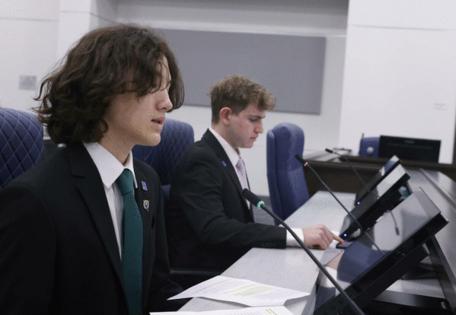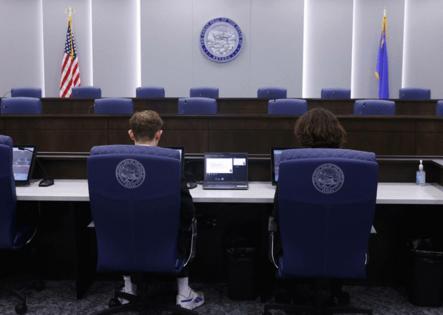Teens' bill would expand protections against antisemitism in Nevada
Published in News & Features
Two Las Vegas teens are lobbying Nevada lawmakers to add a definition of antisemitism to state law — all before the pair is eligible to vote.
Ethan Cohen, 15, a sophomore at Meadows School, and Meyer DeLee, 14, a freshman at Las Vegas Academy, said in an interview they were inspired to bring up what became Senate Bill 179 after seeing local examples of the rise in antisemitism since the beginning of the Israel-Hamas war in October 2023. State Sen. James Ohrenschall, D-Las Vegas, sponsored the bill.
Recent examples of antisemitism in Nevada include an incident where a disabled Jewish student had what appeared to be a swastika scratched into his back and “Death 2 Jews” graffiti found in northwest Las Vegas. A report from the Anti-Defamation League released in April found the number of antisemitic assaults, acts of vandalism and campus-related incidents in Nevada increased in 2024, while harassment fell.
Cohen said he’s advocating for the bill because it gives the Nevada Equal Rights Commission a framework when investigating discrimination claims in housing, employment and public accommodations, given that there is not an existing definition of antisemitism in state law. He also said he hopes the bill passes to take a stance against hate.
“It shows that there is a growing intolerance of this hatred that’s been rising,” said Cohen, a member of the Nevada Youth Legislature and local advocate for Jewish groups. “It shows that our elected officials really do care, and that a lot of Jewish Nevadans aren’t alone, they have a lot of support from people who helped craft a policy in our state.”
SB179 would define antisemitism as “a perception of Jewish people which may be expressed as hatred toward Jewish people. The term includes, without limitation, rhetorical and physical manifestations of antisemitism directed toward a Jewish person or non-Jewish person; a Jewish community institution or religious facility; or the property of a Jewish person or non-Jewish person.”
Defining their concern
The bill faced pushback in a Tuesday morning hearing in the Assembly Government Affairs Committee — largely from Jewish advocacy groups. They said the bill’s definition of “antisemitism” was not the same as the widely recognized definition made by the International Holocaust Remembrance Alliance, which includes contemporary examples of antisemitic acts and has been adopted by other jurisdictions in Nevada, including the Nevada System of Higher Education and the city of Las Vegas.
Jake Bennett, legislative affairs director for the Israeli-American Coalition for Action, said SB179’s definition — which uses “Jewish people” as opposed to IHRA’s use of “Jews” — could only apply to antisemitism as a matter of religious creed. SB179’s language largely mirrors IHRA outside of this difference and does not include examples of contemporary antisemitism.
“It implies that it doesn’t cover antisemitism based on racism or nation of origin discrimination,” he said.
Eli Berne, state advocacy director for the Jewish Federations of North America, told lawmakers they should amend the bill to include the IHRA definition instead.
“The endorsement of an alternative definition undoes years of international cooperation and progress in identifying and combating antisemitism, and would only create confusion on unequal standards,” Berne said.
The American Civil Liberties Union of Nevada also opposed the bill in testimony. Lobbyist Kaylah Maese said the bill was “constitutionally vague and lacks an actual definition of the prohibited conduct.”
Ohrenschall said the differences were “stylistic.” He told the Review-Journal after the hearing that the definitions were slightly different because of advice from drafting attorneys in the Legislative Counsel Bureau, who say the language in Nevada law has to be consistent. He and the teen sponsors said they believed everyone had the same intent.
“I’m still going to see if there’s common ground,” Ohrenschall said.
Assembly members also asked during the hearing how the bill would affect someone’s free speech rights. Danielle Gallant, R-Las Vegas, said that as somebody who grew up in an interfaith household, she heard “plenty of (hate speech) growing up” but knew that it was within those people’s rights to say it.
Cohen, who is a two-time Review-Journal Academic Excellence Award winner and founded a teen advocacy group called the National Holocaust Youth Council, said the bill would not affect someone’s freedom of speech but would empower the Equal Rights Commission to consider antisemitism when investigating claims of discrimination in specific circumstances.
Gallant asked what a “non-Jewish person” meant. Cohen said that includes discrimination against someone who is perceived to be Jewish, but isn’t actually. For instance, if someone is discriminated against for their last name, which is believed to be Jewish but is not.
The bill must pass out of committee by Friday’s second committee passage deadline to be considered by the Assembly. It passed the Senate 20-1 on April 22, with Sen. Ira Hansen, R-Sparks, casting the sole no vote.
___
©2025 Las Vegas Review-Journal. Visit reviewjournal.com.. Distributed by Tribune Content Agency, LLC.










Comments